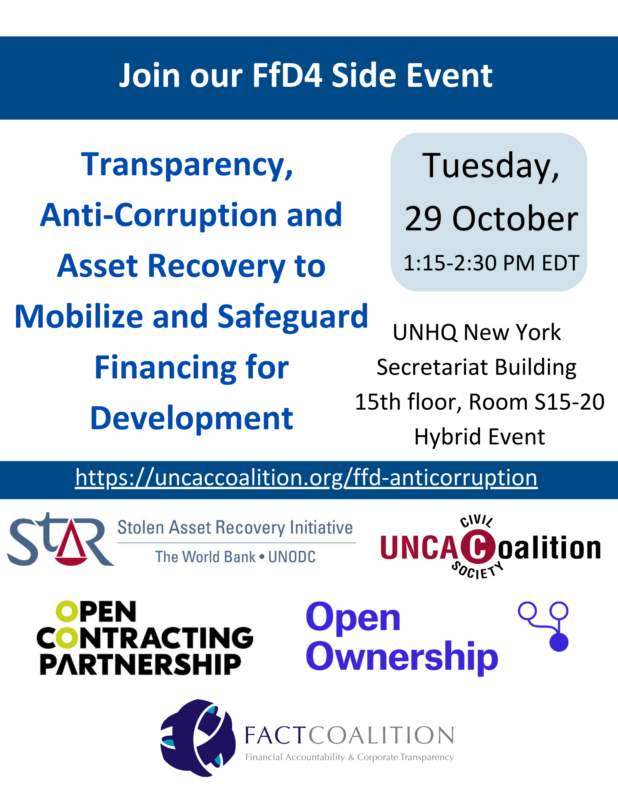Side event for the Multistakeholder Meeting in preparation of the 4th Financing for Development Conference (FfD4):
“Transparency, Anti-Corruption and Asset Recovery to Mobilize and Safeguard Financing for Development”
Organizers: UNCAC Coalition, Stolen Asset Recovery Initiative (StAR – UNODC / World Bank), Open Contracting Partnership, Open Ownership, FACT Coalition,
When: Tuesday, 29 October 2024, 1:15-2:30 PM EDT
Where: United Nations Headquarters New York, Secretariat Building, 15th floor, Room S15-20
Hybrid Event – Join on MS Teams through this link
Speakers:
Ian Gary, Executive Director, FACT Coalition
Elsa Gopala Krishnan, Crime Prevention and Criminal Justice Officer, UNODC / StAR
Kristen Robinson, Head of Advocacy, Open Contracting Partnership
Thom Townsend, Executive Director, Open Ownership
David Ugolor, Co-Chair, UNCAC Coalition
Moderator:
Corinna Gilfillan, Senior Analyst, UNCAC Coalition
Event outline
The side event will discuss the importance of mainstreaming anti-corruption, transparency and accountability throughout the Financing for Development agenda.
The event will discuss the need for Member States to enhance their efforts to implement the UN Convention against Corruption (UNCAC), including through a strengthened review mechanism that would allow for the effective monitoring of international anti-corruption commitments. Panelists will discuss the impact open contracting in ensuring that public funds reach the intended beneficiaries and how beneficial ownership transparency can be a game-changer in addressing conflicts of interest and corruption risks while also helping combat tax evasion and other illicit financial flows.
The panel will also touch on the need to tackle enablers of corruption and highlight the central role of civil society in promoting transparency and accountability in the Financing for Development agenda. Furthermore, the session will elaborate on the need for and opportunities to enhance the recovery of proceeds of corruption and their transparent and accountable return to the countries of origin and communities harmed by corruption.

Full description
Corruption is a cross-cutting issue, impacting all aspects of the Financing for Development agenda. By including and investing in proven anti-corruption measures, we can ensure that financial resources are more effectively utilized for sustainable development. The United Nations Convention against Corruption (UNCAC), with 191 States Parties, provides the only comprehensive, binding global framework for addressing corruption. It also provides a range of provisions that strengthen transparency, accountability and domestic resource mobilization, establish good governance and positively affect all other sources of funding for development, including official development assistance, private sector investment, international trade and public debt. As evidence increasingly shows, anti-corruption measures could help ensure that more funds are mobilised for development and have a transformative impact.
The disclosure of information on the true owners of companies and other corporate vehicles is an essential part of a well-functioning and fair economy and society. When governments, businesses, and citizens can readily access accurate, complete, and high-quality information on the people who own, control, or benefit from companies – the beneficial owners –, they can use this information to achieve their goals, including reducing corruption and tax evasion, improving procurement, and creating a well-functioning business environment.
Beneficial Ownership Transparency (BOT) has consistently featured in discussions on financing for development and is recognised as a key mechanism to achieve the objective that the “international tax system and financial integrity policies should serve all countries”. However, it is a foundation reform to tackle conflicts of interests and corruption, as it helps to unmask those who are behind corporate vehicles that can be misused to appropriate public funds, hide opaqued-owned wealth, or help politically exposed persons remain in the dark.
Likewise, public procurement – governments’ number one corruption risk – can be tackled through transparency and accountability throughout the contracting process. Public procurement touches every part of our lives and it is where citizens see governments deliver on promises of sustainable development or fall short of their expectations, damaging trust in the fairness and effectiveness of government. Open contracting takes a systemic approach to public procurement that has proven effective, using data, technology, civic participation and institutional change.
Implementing the UNCAC in full, and subsequent UNCAC CoSP resolutions 9/7 (2021) and 10/6 (2023) on beneficial ownership transparency, and resolution 10/9 (2023) on transparency and integrity in public procurement, can help to achieve financing for development goals, ensuring resources are allocated where they are most needed. Recent research highlights that “domestic public resources cannot be fully shielded from corrupt abuses unless integrity risks relating to private investment, development assistance, international trade and opaque debt are addressed” (U4 Anti-corruption Resource Centre, 2024).
This panel will touch on these key reforms that enhance transparency, accountabilty and inclusiveness to combat corruption and mobilize funds towards achieving the SDGs. Additionally, the panel will draw on existing evidence on the crucial part civil society plays in addressing corruption. The Panama and Pandora Papers illustrate how civil society and journalists can expose corruption and tax abuse. Ensuring these actors have sufficient and timely access to information, including beneficial ownership information and sufficient detail throughout the public procurement cycle, is critical to their success.
Finally, asset recovery and return are critical aspects of the fight against corruption and inclusive asset recovery strategies support the work of law enforcement agencies as well as how they can collaborate with various stakeholders. The joint UNODC and World Bank Stolen Asset Recovery (StAR) Initiative works with States Parties to the UNCAC and stakeholders to support the implementation of Chapter V and facilitate asset recovery and return by strengthening country capacity to prevent the loss of stolen assets and recover them in an efficient and timely manner, for the benefit of communities that are victims of corruption.



